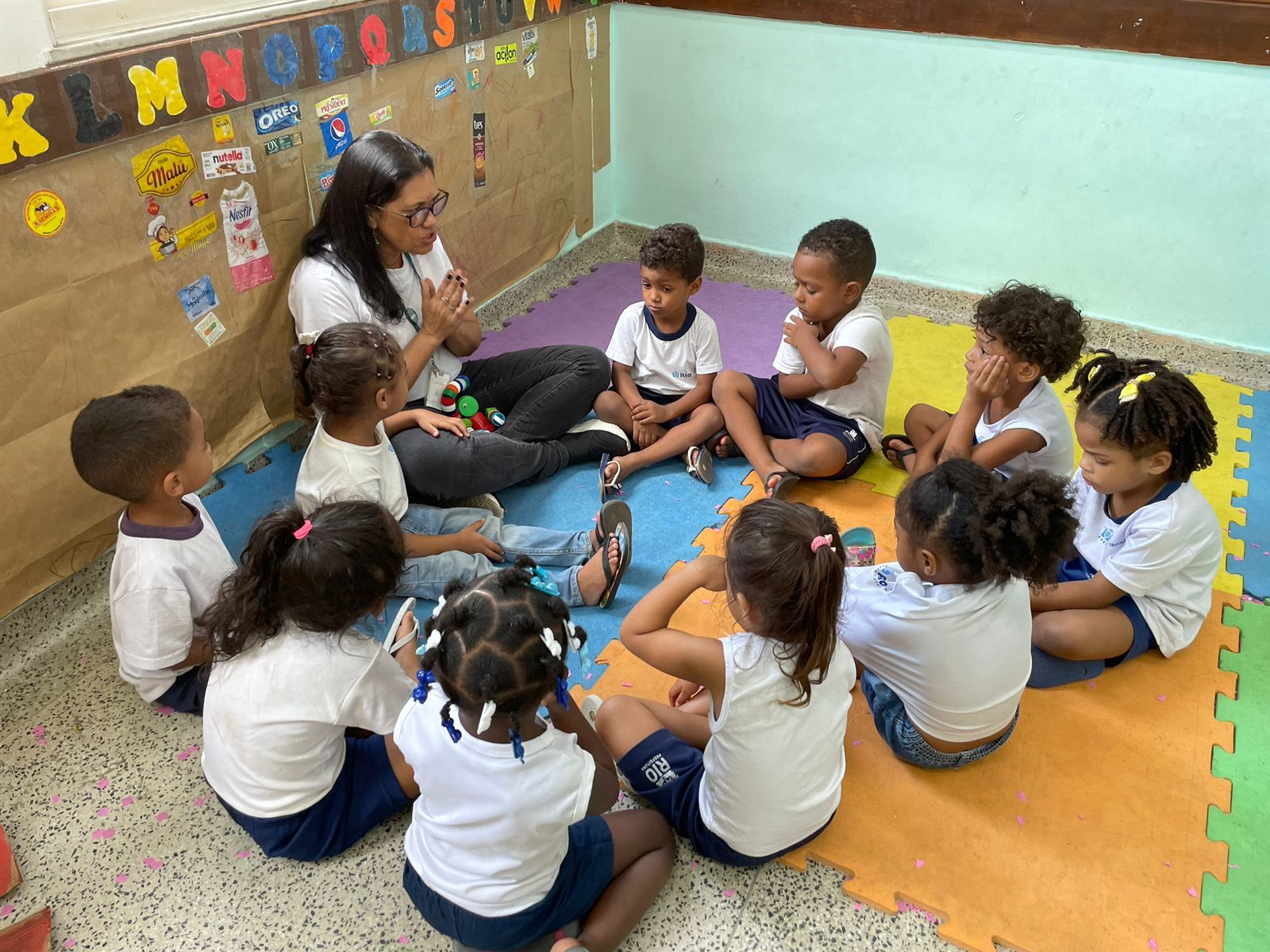
Clique aqui para Português
Valdirene Oliveira Militão, affectionately known as Val in the Roquete Pinto favela in Complexo da Maré, located in Rio de Janeiro’s North Zone, where she has lived for 52 years, embodies the possibility of everyday sustainable practices accessible to favela residents. Agroecology and sustainability, which increasingly gain space in public debate, are knowledge passed down in the favela in an affectionate and local manner by elders. Yet, these grassroots insights are made invisible and delegitimized for being practical, conceived through lived experience and need, through “pretagogias” [Black pedagogical practices]. Such values only become accepted and seen as a solution when they are whitewashed and transformed into commodities, into tools of control.
View this post on Instagram
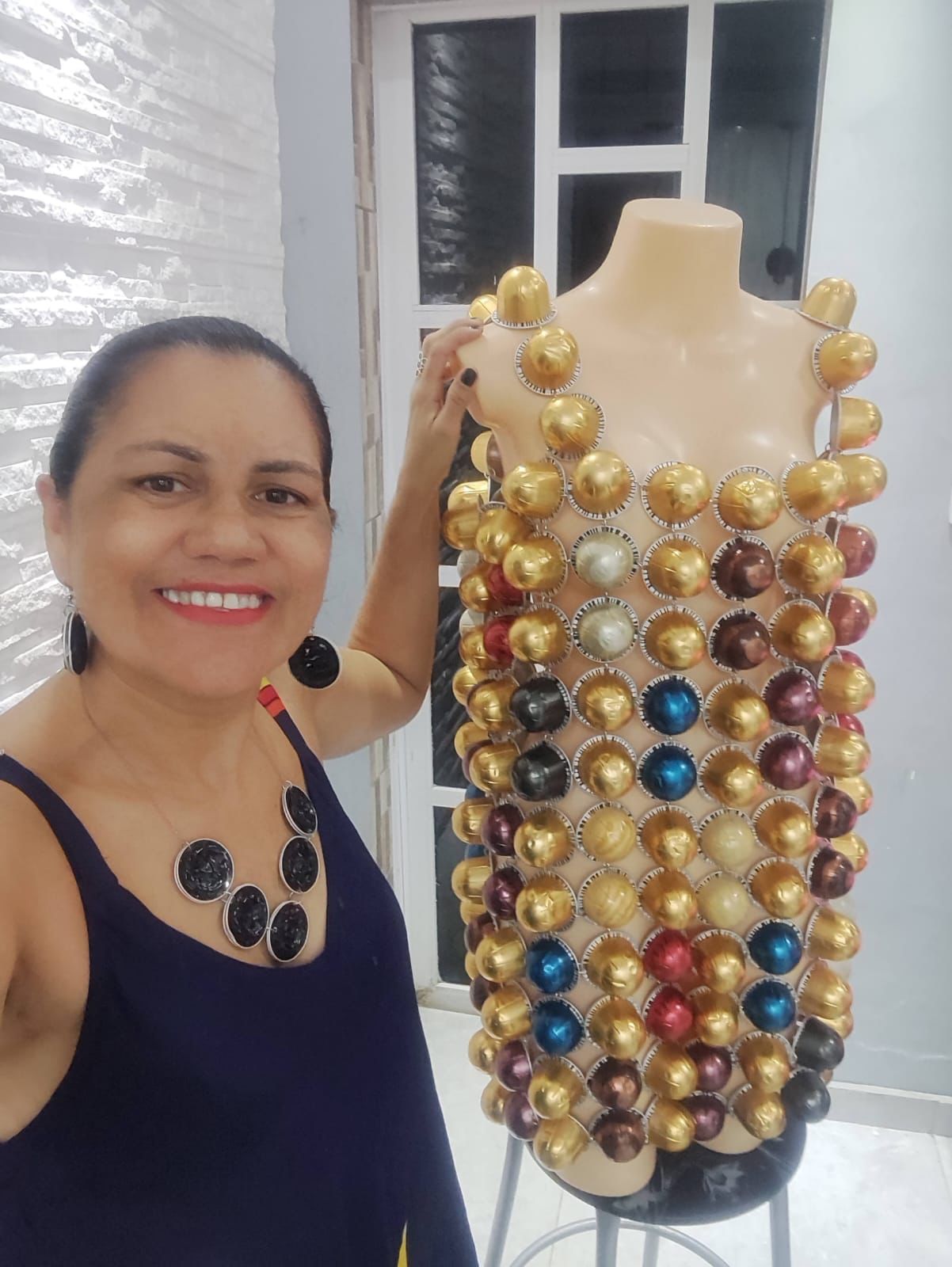
In this sense, reusing waste and (re)creating from scrap materials Val resignifies life and her community with her hands. This fusion of perspectives encapsulates Valdirene Militão’s initiatives toward sustainability and the economic empowerment of women. Through workshops, she teaches other women how to repurpose leftover materials to transform and market them, generating income.
In the area surrounding her home studio, where she carries out recycling activities, Val gathers milk cartons to craft protective blankets for animals. Additionally, the visual artist collects coffee capsules, costume jewelry, and PET bottles to fashion decorative objects and clothing. Notably, she gathered 204 coffee capsules to create a futuristic-style garment worn by digital influencer Yá Burihan at the 2024 Vogue Magazine Carnival Ball.
“I made the dress in two days but spent a week planning it.” — Valdirene Militão
In addition to her career as a visual artist, Val promotes other sustainable initiatives. She was one of the founders of the Ricardo Barriga Project, which emerged during the coronavirus pandemic in 2020 to generate income for Maré residents and promote food security. The initiative was named in honor of Ricardo Barriga, Val’s former brother-in-law, who died of Covid-19. The activities aim to promote a culture of sustainability, such as workshops on making soap from used cooking oil, distribution of baskets of basic foodstuffs, face masks, and eco-friendly soap.
View this post on Instagram
Green Income Generation, Women’s Empowerment, and Sustainable Childhood
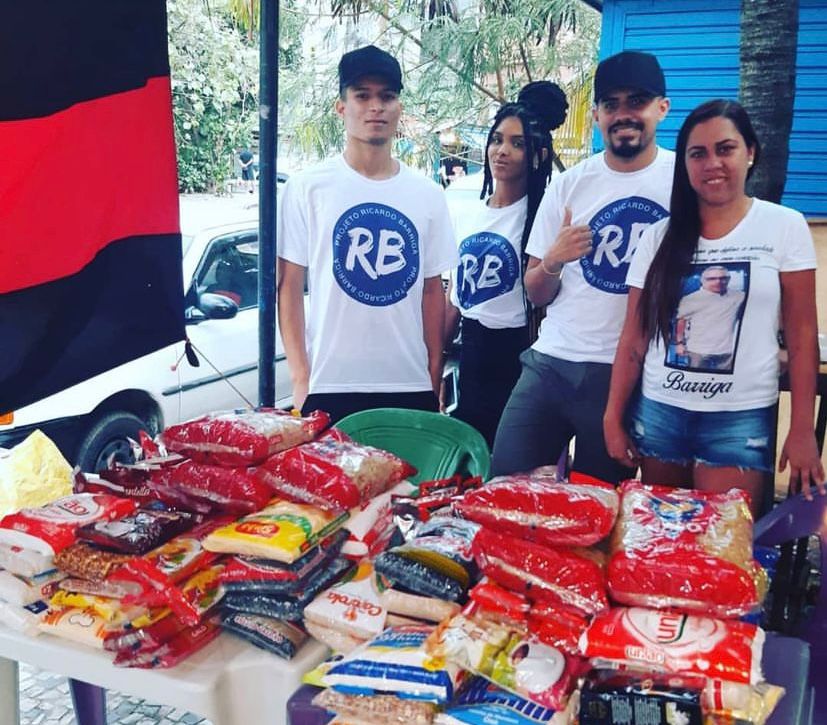
In the context of the pandemic, which exacerbated food insecurity in the favelas, the Favela Data Institute, in partnership with Locomotiva Research and Strategy and the Central Única das Favelas (CUFA), revealed that 70% of favela residents did not have sufficient money for food. To reverse this grim reality, the Ricardo Barriga Project dedicated itself to collecting and distributing baskets of basic foodstuffs, as told by Ednalva do Nascimento, a resident of Piscinão de Ramos in Maré:
“Life during the pandemic was terrible not only for me, but for the entire community. We lost many of our neighbors. Not to mention the enormous impact the pandemic had on the lives of favela residents. Many people experienced great need, and the food baskets helped a lot, especially those who lost their jobs.”
In addition to addressing immediate needs such as distributing food baskets, Val also thought long-term during the pandemic. Her focus on sustaining and empowering families and women in the favelas led her to organize workshops on reusing cooking oil. Through the Fiocruz Mata Atlântica program, she conducted an online workshop on soap-making from used oil, creating the opportunity for residents to sell the soap locally for income generation and household savings.
“I started making soap to save money at home and for personal use. Eventually, I began selling them, which allowed me to support my family during a very difficult time. This experience has given me knowledge that will stay with me for life.” — Fátima Maria da Silva
In the same vein, Val teaches how to produce other sustainable products essential for fighting social vulnerability in the favelas. Striving for menstrual dignity, for example, she teaches to produce sustainable menstrual pads.
“Many women don’t even have the money to buy a sanitary pad. Besides giving them autonomy to come and go, women can generate income by selling these pads. Plus, they don’t pollute the planet because they’re reusable.” — Valdirene Militão
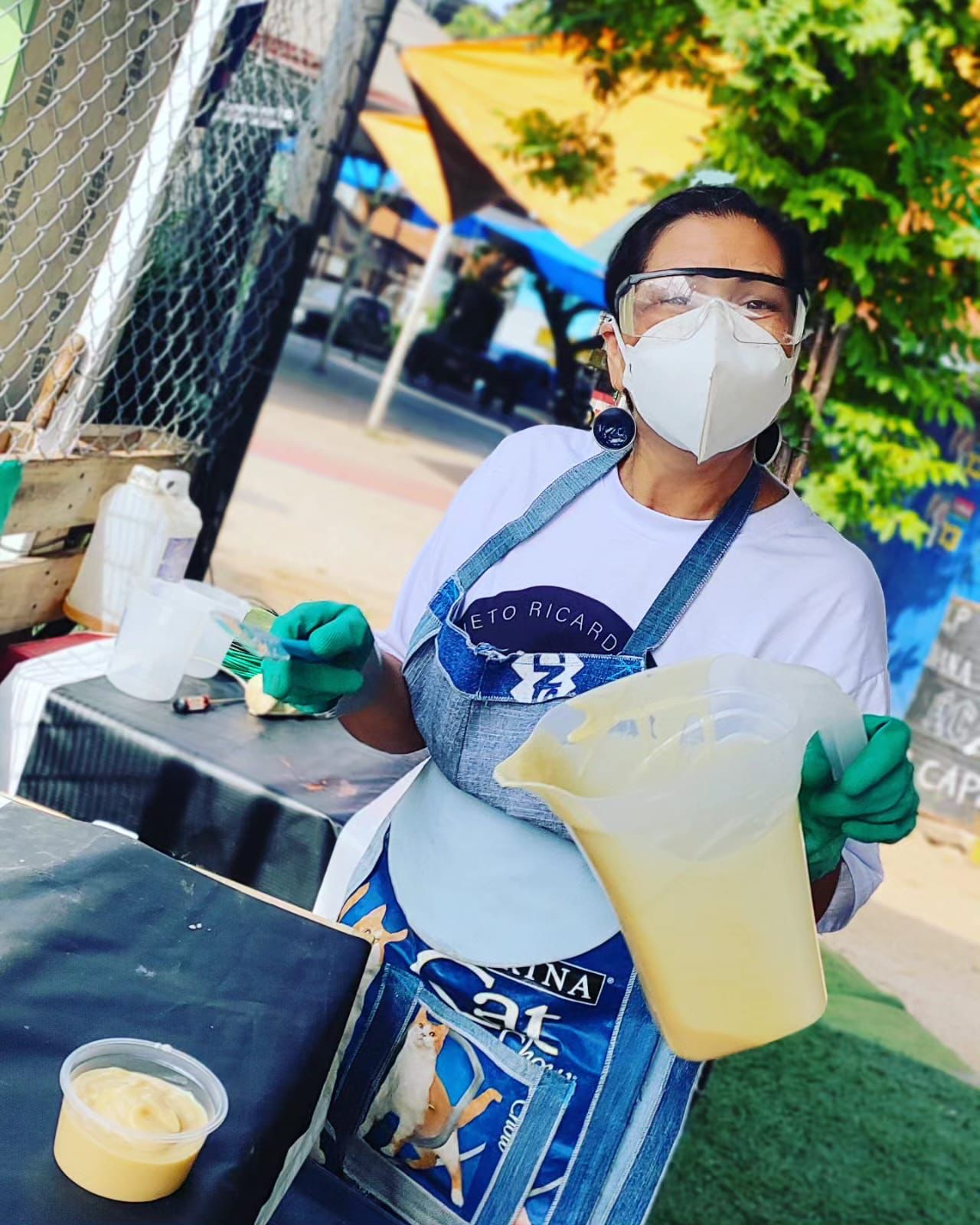
In addition to generating income, Val’s sustainable productions and innovative ideas impact new generations, since she also holds workshops for children, teaching them to build toys from bottle caps and PET bottles. These materials are transformed into cars, blenders, rattles, and more. This is what Rosário Frazão, a resident of Piscinão de Ramos and former student of Val Militão, recalls: “Children learn how to take care of nature by reusing materials.”
Winner of ALERJ’s ‘Woman Citizen’ Award
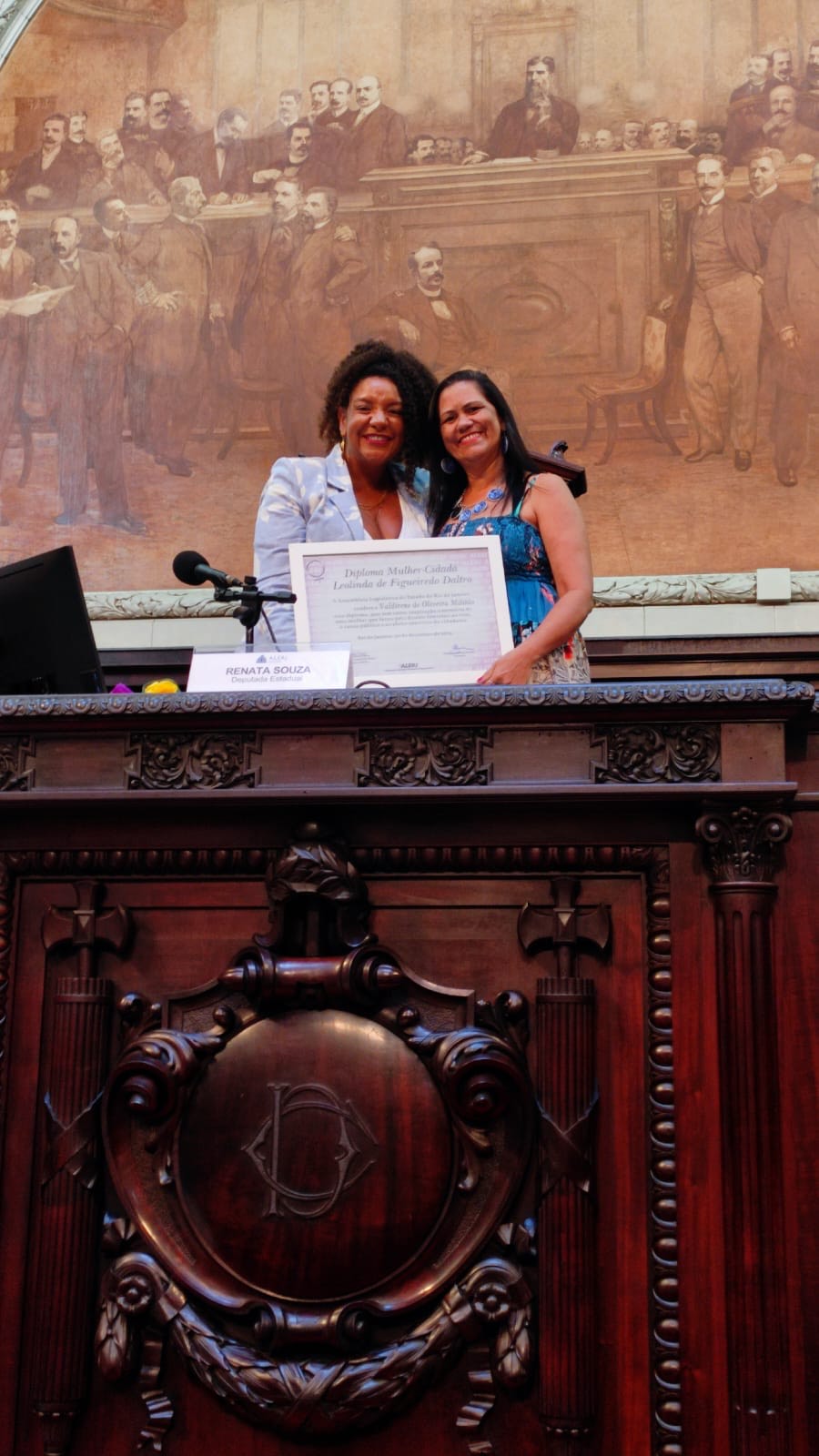
For a life dedicated to sustainability and economic empowerment of women in the favelas, Val received the Leolinda Daltro Woman Citizen Diploma, awarded to her by the Rio de Janeiro State Legislative Assembly (ALERJ)’s Women’s Rights Committee on International Women’s Day 2024. This year, the award was granted to ten women who fight for gender equity in the state of Rio de Janeiro. Alongside Val Militão, the following were honored: Angela Andrade, Enfermeira Rejane, Joyce Trindade, Mariana Torres, Marinete Silva, Moana Martins, Patrícia Felix, Rafaela França, and Sabrina Rodrigues.
Val is an inspiring example of how agroecology and sustainability can be tools for social transformation in the favelas, the areas most impacted by environmental racism and socio-environmental injustice in Brazilian cities. Despite being vulnerable due to State neglect, favela residents like Valdirene Militão are protagonists in the fight for a sustainable city and for favelas resilient to climate change.
“Sustainability is our priority… nature, our source of life and wealth, is calling for help… we fight for a better planet, we come together in this chain of faith and courage, facing this giant tsunami, asking people to become aware, because we need each other, for better changes… taking simple actions, like ‘if you got it dirty, clean it up’… Cleaning up the streets, beaches, streams, bays, the environment, the waters… Recycle trash and turn it into art, into money to buy your daily bread. Sustainability is our focus for our survival.” — Rosário Frazão
Through her initiatives, Val highlights that everyday sustainable and accessible practices can generate income, economic independence, and empowerment for women. The favelas are spaces of resistance where residents build innovative solutions to their problems. Valdirene Militão’s work is a beacon of hope that demonstrates the potential of sustainability in the favelas through environmental education, appreciation of traditional knowledge, and creativity. The struggle of women like Val will make it possible to build a greener, fairer, and more prosperous Rio de Janeiro for everyone.
About the author: Carol Marinho was born and raised in Complexo do Alemão, holds a master’s degree in Ethnic-Racial relations, and is an educator and journalist.
